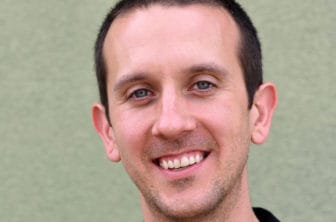COMMENTARY: The list of priorities police officers should consider in a tactical situation seemed fairly logical: Hostages came first. Then other civilians. Law enforcement came next, followed by the “suspect/subject.” Last was property.

Heath Haussamen
While discussing those priorities, Major Brent Barlow referred to “suspects” as “criminals.” And people interrupted, for the umpteenth time, the use-of-force training being taught by Barlow and Detective Larry Louick of the Doña Ana County Sheriff’s Department on Friday.
“I don’t think you realized that you just did it,” state Rep. Bill McCamley said, “but you said ‘criminal’ and you pointed to ‘suspect.’” People wanted to know: What if the person was doing nothing wrong?
He would be the same priority on the chart either way, the officers replied.
That wasn’t the point people were trying to make. Barlow asked for help understanding.
“If we’re saying the suspect is already a criminal then there’s no hope for me,” said Timothy Nelson, who works for the YWCA in El Paso and was the one black man in the group.
“It’s not just semantics. It’s power. Language is power. The way that we talk about things then influences our actions later,” said Sara Melton, who works for the community organizing group Comunidades en Acción y de Fé (CAFé).
Louick said he was glad people raised their concerns. He and Barlow were more sensitive after that about the language they used to describe the people police encounter.
The day was mentally and emotionally exhausting. The officers filled our heads with information about the law and their training. They showed us graphic videos that often ended with civilians or police officers dying. I gained a better understanding of the difficult job police officers do. Some others who took the course told me they learned a lot too.
There were many difficult moments when people pushed back. There were emotional outbursts and tears. We didn’t always find common ground. We didn’t figure out how to reduce crime, officer-involved shootings, or attacks on police officers. We didn’t come up with ways to eradicate systemic racism or poverty.
But the conversation mattered. We listened and worked to understand each other. I don’t believe we can improve society without building such bridges.
We must improve. Our police officers are on the front lines against the societal ills we have failed to address on a systemic level. “I’ve done plenty of social work as a cop,” Barlow told us.
That’s often dangerous for the officers and the people they encounter. Thrown into sometimes impossible situations, good police officers do the best they can. But they’re asked to do too much.
We need to commit to having the difficult conversations that will help us move forward.
One bright spot from the training was the agreement we found about the importance of citizens filming police. While Louick and Barlow cautioned that a video doesn’t always tell the whole story – it’s a piece of evidence that must be considered in context – both support people making recordings. “Film us all day long,” Louick said.
Some film to protect people from cops. Louick and Barlow said it also protects police from false allegations. Before police agencies were using vehicle or body cameras, Barlow used a personal audio recorder to document his encounters with people.
Barlow is retiring this month. I hope Louick is able to continue these trainings. Every law enforcement agency should engage citizens in these difficult, informative, and relationship-building discussions.
